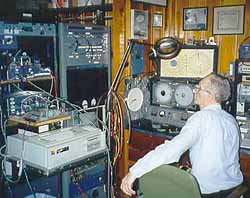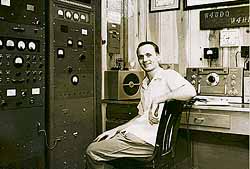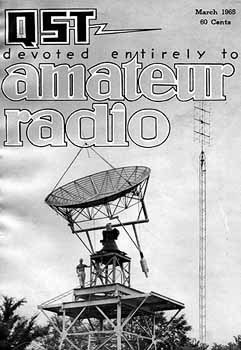(Excerpted from ARRL web)
VHF-UHF Pioneer Paul M. Wilson, W4HHK, SK
December 1, 1999
 NEWINGTON, CT,
Dec 1, 1999--VHF-UHF pioneer Paul Wilson, W4HHK, of Collierville, Tennessee, died November
29. He was 75. This past summer, Wilson battled pneumonia then suffered a massive heart
attack in late October. He was still in the hospital recovering when he had a second heart
attack.
NEWINGTON, CT,
Dec 1, 1999--VHF-UHF pioneer Paul Wilson, W4HHK, of Collierville, Tennessee, died November
29. He was 75. This past summer, Wilson battled pneumonia then suffered a massive heart
attack in late October. He was still in the hospital recovering when he had a second heart
attack.
A stalwart in the 144-MHz and Microwave Standings, Wilson remained active right up
until his health deteriorated earlier this year. In early July, he completed his VUCC on
10 GHz. He celebrated his 75th birthday in September by making his first contact on 24
GHz.
"Paul's life should inspire every amateur to strive to always try something new in
Amateur Radio, regardless of age or health," said ARRL Vice President Joel Harrison,
W5ZN--a friend of Wilson's. "He was a gentleman. He has definitely been an example
for me. I will miss him."
 Wilson's early
work in VHF and UHF began prior to World War II--in the days before the 2-meter band even
existed. He got his ham ticket in 1941 at the age of 16. While still in high school, he
began experimenting on the old 2-1/2 meter band (112 MHz). After serving in the Merchant
Marine as a radio operator during World War II, he rekindled his interest in "the
ultra highs" as VHF and UHF used to be called. During the late 1940s, Wilson became a
major figure on the then-new 2-meter band.
Wilson's early
work in VHF and UHF began prior to World War II--in the days before the 2-meter band even
existed. He got his ham ticket in 1941 at the age of 16. While still in high school, he
began experimenting on the old 2-1/2 meter band (112 MHz). After serving in the Merchant
Marine as a radio operator during World War II, he rekindled his interest in "the
ultra highs" as VHF and UHF used to be called. During the late 1940s, Wilson became a
major figure on the then-new 2-meter band.
During the 1950s, he almost accidentally got into meteor scatter propagation when he
noticed what he later found out were meteor bursts on the signal of a distant station he
was trying to work. In 1954, W4HHK and Tommy Thomas, W2UK in New Jersey sent and received
reports via 2-meter meteor scatter over a 950-mile (1520 km) path--a first! W4HHK and W2UK
won the ARRL Technical Merit Award for 1955.
 Wilson took on
the challenge of Earth-Moon-Earth propagation as well, and in 1961 he began work on an
18-foot dish. He was among those making their first 70-cm EME contacts in July 1965. From
that frontier, he moved on to attempt 2304 MHz moonbounce, and he won the ARRL Technical
Merit Award for 1969 for his work on that band. In 1970, W4HHK and W3GKP claimed a new
record--the first 2304-MHz EME contact.
Wilson took on
the challenge of Earth-Moon-Earth propagation as well, and in 1961 he began work on an
18-foot dish. He was among those making their first 70-cm EME contacts in July 1965. From
that frontier, he moved on to attempt 2304 MHz moonbounce, and he won the ARRL Technical
Merit Award for 1969 for his work on that band. In 1970, W4HHK and W3GKP claimed a new
record--the first 2304-MHz EME contact.
In 1968, Wilson used the same 18-foot dish to monitor the Apollo X command
module on 2.2 GHz as the astronauts orbited the moon in the early days of the manned space
program. He received a NASA confirmation of his reports in the form of a photograph signed
by all the astronauts on the mission.
Noted VHF-UHFer Al Ward, W5LUA, who worked W4HHK on EME on many occasions, was among
those saddened by Wilson's passing. "Paul's signal on 2304 EME was like a beacon
station, and his presence will be missed by all who have worked him in the last 29 years
off the moon," Ward said. "Over the years, Paul gave many an EMEer their first
QSO on 2304 MHz. Paul was a true VHF pioneer. I will miss him."
Wilson retired in 1980 after 30 years as an engineer for TV station WMC in Memphis. His
wife "DB"--to whom he was married for 54 years--is W4UDQ. His son, Steven, is
N4HHK.
A staunch League supporter, Wilson was frequently in the pages of QST over the
years--both as an author and as a subject. Wilson also served as an ARRL Technical Adviser
for VHF, UHF, meteor scatter and EME. In his December 1999 QST "It Seems to Us
. . ." editorial, ARRL Executive Vice President David Sumner, K1ZZ, singled out
Wilson as an Amateur Radio hero for his pioneering accomplishments.
Wilson's other memberships included Army MARS, the Society of Wireless Pioneers, the
Mid-South Amateur Radio Association, and the Central States VHF Society. The Central
States VHF Society awarded Wilson its Chambers Award in 1986 for "his continuing
technical contributions to UHF, especially EME on 13cm."
A service will be held December 2 in Collierville.
Editor's note: Some information for this report originally appeared in
"Paul Wilson, W4HHK--VHF and UHF Pioneer" in "The World Above 50 MHz,"
QST, Mar 1995, edited by Emil Pocock, W3EP.
 NEWINGTON, CT,
Dec 1, 1999--VHF-UHF pioneer Paul Wilson, W4HHK, of Collierville, Tennessee, died November
29. He was 75. This past summer, Wilson battled pneumonia then suffered a massive heart
attack in late October. He was still in the hospital recovering when he had a second heart
attack.
NEWINGTON, CT,
Dec 1, 1999--VHF-UHF pioneer Paul Wilson, W4HHK, of Collierville, Tennessee, died November
29. He was 75. This past summer, Wilson battled pneumonia then suffered a massive heart
attack in late October. He was still in the hospital recovering when he had a second heart
attack. 
